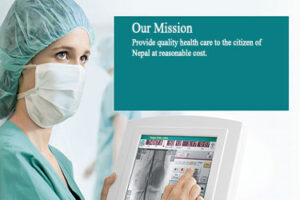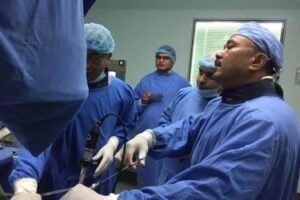
Manmohan Memorial Medical College and Teaching Hospital is committed to enhancing the quality of life of the Nepali people by utilizing evidence-based practices complemented by research activities. Our mission is to provide high-quality healthcare services that are grounded in research and driven by a commitment to evidence-based practices.
Through our programs and services, we strive to improve the health and well-being of our patients, their families, and the broader community. We recognize the importance of research in advancing medical knowledge and improving healthcare outcomes, and we are dedicated to conducting research that is both rigorous and relevant to the needs of our community.
At Manmohan Memorial Medical College and Teaching Hospital, we believe that healthcare is a fundamental human right, and we are committed to providing equitable access to quality healthcare services for all members of our community. Our team of highly trained and compassionate healthcare professionals work tirelessly to provide the best possible care to our patients, and we are constantly seeking ways to improve our practices and services through ongoing research and evaluation.
In everything we do, we are guided by a commitment to excellence, integrity, and compassion, and we are proud to be a leader in the provision of evidence-based healthcare services in Nepal

Manmohan Memorial Medical College and Teaching Hospital are committed to promoting health and wellbeing among individuals by providing evidence-based health services. Our vision is to ensure that every person can lead a fulfilling life with sound physical, mental, and emotional health and dignity.
We believe that access to quality health services is a fundamental human right and essential for achieving sustainable development. To achieve our vision, we aim to provide comprehensive health services that are accessible, affordable, and responsive to the needs of individuals and communities.
Our approach is based on the latest scientific knowledge and evidence-based practices, and we continuously strive to improve the quality of our services through research and innovation. We also recognize the importance of collaboration and partnerships with other healthcare providers, stakeholders, and the community to promote a healthy and supportive environment for all.
We are committed to providing compassionate and patient-centered care that respects the dignity and autonomy of every individual. Our team of highly qualified and dedicated healthcare professionals is trained to provide personalized care that addresses the unique needs and preferences of each patient.
At Manmohan Memorial Medical College and Teaching Hospital, we believe that health and wellbeing are integral to human flourishing and a sustainable future. We are committed to playing a leading role in promoting health and wellbeing and contributing to the advancement of knowledge and innovation in healthcare.
